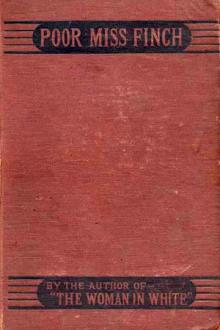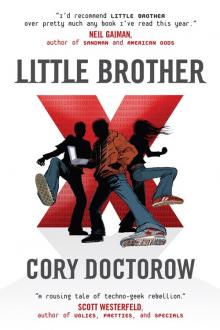Poor Miss Finch by Wilkie Collins (feel good novels txt) 📕

- Author: Wilkie Collins
- Performer: -
Book online «Poor Miss Finch by Wilkie Collins (feel good novels txt) 📕». Author Wilkie Collins
It was a moment of breathless interest. Who could say what an influence on her future life might be exercised by this quaint kindly uncouth little foreign man? How anxiously we watched those shaggy eyebrows, those piercing goggle eyes! And, oh, heavens, how disappointed we were at the first result! Lucilla suddenly gave a little irrepressible shudder of disgust. Herr Grosse drew back from her, and glared at her benignantly with his diabolical smile.
“Aha!” he said. “I see what it is. I snuff, I smoke, I reek of tobaccos. The pretty Miss smells me. She says in her inmost heart—Ach Gott, how he stink!”
Lucilla burst into a fit of laughter. Herr Grosse, unaffectedly amused on his side, grinned with delight, and snatched her handkerchief out of her apron-pocket. “Gif me scents,” said this excellent German. “I shall stop up her nose with her handkerchiefs. So she will not smell my tobacco-stinks—all will be nice-right again—we shall go on.” I gave him some lavender-water from a scent-bottle on the table. He gravely drenched the handkerchief with it, and popped it suddenly on Lucilla’s nose. “Hold him there, Miss. You cannot for the life of you smell Grosse now. Goot! We may go on again.”
He took a magnifying glass out of his waistcoat pocket, and waited till Lucilla had fairly exhausted herself with laughing. Then the examination—so cruelly grotesque in itself, so terribly serious in the issues which it involved—resumed its course: Herr Grosse glaring at his patient through his magnifying glass; Lucilla leaning back in the chair, holding the handkerchief over her nose.
A minute, or more, passed—and the ordeal of the examination came to an end.
Herr Grosse put back his magnifying glass with a grunt which sounded like a grunt of relief, and snatched the handkerchief away from Lucilla.
“Ach! what a nasty smell!” he said, holding the handkerchief to his nose with a grimace of disgust. “Tobaccos is much better than this.” He solaced his nostrils, offended by the lavender-water, with a huge pinch of snuff. “Now I am going to talk,” he went on. “See! I keep my distance. You don’t want your handkerchiefs—you smell me no more.”
“Am I blind for life?” said Lucilla. “Pray, pray tell me, sir! Am I blind for life?”
“Will you kees me if I tell you?”
“Oh, do consider how anxious I am! Pray, pray, pray tell me!”
She tried to go down on her knees before him. He held her back firmly and kindly in her chair.
“Now! now! now! you be nice-goot, and tell me this first. When you are out in the garden, taking your little lazy lady’s walks on a shiny-sunny day, is it all the same to your eyes as if you were lying in your bed in the middles of the night?”
“No.”
“Hah! You know it is nice-light at one time? you know it is horrid-dark at the odder?”
“Yes.”
“Then why you ask me if you are blind for life? If you can see as much as that, you are not properly blind at all?”
She clasped her hands, with a low cry of delight. “Oh, where is Oscar?” she said softly. “Where is Oscar?” I looked round for him. He was gone. While his brother and I had been hanging spell-bound over the surgeon’s questions and the patient’s answers, he must have stolen silently out of the room.
Herr Grosse rose, and vacated the chair in favor of Mr. Sebright. In the ecstasy of the new hope now confirmed in her, Lucilla seemed to be unconscious of the presence of the English oculist, when he took his colleague’s place. His grave face looked more serious than ever, as he too produced a magnifying glass from his pocket, and, gently parting the patient’s eyelids, entered on the examination of her blindness, in his turn.
The investigation by Mr. Sebright lasted a much longer time than the investigation by Herr Grosse. He pursued it in perfect silence. When he had done he rose without a word, and left Lucilla as he had found her, rapt in the trance of her own happiness—thinking, thinking, thinking of the time when she should open her eyes in the new morning, and see!
“Well?” said Nugent, impatiently addressing Mr. Sebright. “What do you say?”
“I say nothing yet.” With that implied reproof to Nugent, he turned to me. “I understand that Miss Finch was blind—or as nearly blind as could be discovered—at a year old?”
“I have always heard so,” I replied.
“Is there any person in the house—parent, or relative, or servant—who can speak to the symptoms noticed when she was an infant?”
I rang the bell for Zillah. “Her mother is dead,” I said. “And there are reasons which prevent her father from being present to-day. Her old nurse will be able to give you all the information you want.”
Zillah appeared. Mr. Sebright put his questions.
“Were you in the house when Miss Finch was born?”
“Yes, sir.”
“Was there anything wrong with her eyes at her birth, or soon afterwards?”
“Nothing, sir.”
“How did you know?”
“I knew by seeing her take notice, sir. She used to stare at the candles, and clutch at things that were held before her, as other babies do.”
“How did you discover it, when she began to get blind?”
“In the same way, sir. There came a time, poor little thing, when her eyes looked glazed-like, and try her as we might, morning or evening, it was all the same—she noticed nothing.”
“Did the blindness come on gradually?”
“Yes, sir—bit by bit, as you may say. Slowly worse and worse one week after another. She was a little better than a year old before we clearly made it out that her sight was gone.”
“Was her father’s sight, or her mother’s sight ever affected in any way?”
“Never, sir, that I heard of.”
Mr. Sebright turned to Herr Grosse, sitting at the luncheon-table resignedly contemplating the Mayonnaise. “Do you wish to ask the nurse any questions?” he said.
Herr Grosse shrugged his shoulders, and pointed backwards with his thumb at the place in which Lucilla was sitting.
“Her case is as plain to me as twos and twos make fours. Ach Gott! what do I want with the nurse?” He turned again longingly towards the Mayonnaise. “My fine appetites is going! When shall we lonch?”
Mr. Sebright dismissed Zillah with a frigid inclination of the head. His discouraging manner made me begin to feel a little uneasy. I ventured to ask if he had arrived at a conclusion yet. “Permit me to consult with my colleague before I answer you,” said the impenetrable man. I roused Lucilla. She again inquired for Oscar. I said I supposed we should find him in the garden—and so took her out. Nugent followed us. I heard Herr Grosse whisper to him piteously, as we passed the luncheon-table, “For the lofe of Heaven, come back soon, and let us lonch!” We left the ill-assorted pair to their consultation in the sitting-room.
WE had certainly not been more than ten minutes in the garden, when we were startled by an extraordinary outbreak of shouting in broken English, proceeding from the window of the sitting-room. “Hi-hi-hoi! hoi-hi! hoi-hi!” We looked up, and discovered Herr Grosse, frantically waving a huge red silk handkerchief at the window. “Lonch! lonch!” cried the German surgeon. “The consultations is done. Come begin-begin.”
Obedient to this peremptory summons, Lucilla, Nugent, and I returned to the sitting-room. We had, as I had foreseen, found Oscar wandering alone in the garden. He had entreated me, by a sign, not to reveal our discovery of him to Lucilla, and had hurried away to hide himself in one of the side-walks. His agitation was pitiable to see. He was totally unfit to be trusted in Lucilla’s presence at that anxious moment.
When we had left the oculists together, I had sent Zillah with a little written message to Reverend Finch; entreating him (if it was only for form’s sake) to reconsider his resolution, and be present on the all-important occasion to his daughter of the delivery of the medical opinions on her case. At the bottom of the stairs (on our return), my answer was handed to me on a slip of sermon-paper. “Mr. Finch declined to submit a question of principle to any considerations dictated by mere expediency. He desired seriously to remind Madame Pratolungo of what he had already told her. In other words, he would repeat, and he would beg her to remember this time, that his Foot was down.”
On re-entering the room, we found the eminent oculists seated as far apart as possible one from the other. Both gentlemen were engaged in reading. Mr. Sebright was reading a book. Herr Grosse was reading the Mayonnaise.
I placed Lucilla close by me, and took her hand. It was as cold as ice. My poor dear trembled pitiably. For her, what moments of unutterable suffering were those moments of suspense, before the surgeons delivered their sentence! I pressed her little cold hand in mine, and whispered “Courage!” Truly I can say it (though I am not usually one of the sentimental sort), my heart bled for her.
“Well, gentlemen,” said Nugent, “what is the result? Are you both agreed?”
“No,” said Mr. Sebright, putting aside his book.
“No,” said Herr Grosse, ogling the Mayonnaise. Lucilla turned her face towards me; her color shifting and changing, her bosom rising and falling more and more rapidly. I whispered to her to compose herself. “One of them, at any rate,” I said, “thinks you will recover your sight.” She understood me, and became quieter directly. Nugent went on with his questions, addressed to the two oculists.
“What do you differ about?” he asked. “Will you let us hear your opinions?”
The wearisome contest of courtesy was renewed between our medical advisers. Mr. Sebright bowed to Herr Grosse:
“You first.” Herr Grosse bowed to Mr. Sebright: “No—you!” My impatience broke through this cruel and ridiculous professional restraint. “Speak both together, gentlemen, if you like!” I said sharply. “Do anything, for God’s sake, but keep us in suspense. Is it, or is it not, possible to restore her sight?”
“Yes,” said Herr Grosse.
Lucilla sprang to her feet, with a cry of joy.
“No,” said Mr. Sebright.
Lucilla dropped back again into her chair, and silently laid her head on my shoulder.
“Are you agreed about the cause of her blindness?” asked Nugent.
“Cataracts is the cause,” answered Herr Grosse.
“So far, I agree,” said Mr. Sebright. “Cataract is the cause.
“Cataracts is curable,” pursued the German.
“I agree again,” continued the Englishman—“with a reservation. Cataract is sometimes curable.”
“This cataracts is curable!” cried Herr Grosse.
“With all possible deference,” said Mr. Sebright, “I dispute that conclusion. The cataract, in Miss Finch’s case, is not curable.”
“Can you give us your reasons, sir, for saying that?” I inquired.
“My reasons are based on surgical considerations which it requires a professional training to understand,” Mr. Sebright replied. “I can only tell you that I am convinced—after the most minute and careful examination—that Miss Finch’s sight is irrevocably gone. Any attempt to restore it by an operation, would be, in my opinion, an unwarrantable proceeding. The young lady would not only have the operation to undergo, she would be kept secluded afterwards, for at least six weeks or two months, in a darkened room. During that time, it is needless for me to remind you that she would inevitably form the





Comments (0)